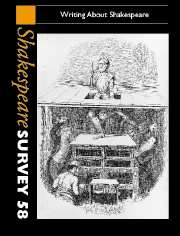Book contents
- Frontmatter
- Having Our Will: Imagination in Recent Shakespeare Biographies
- Toward a New Biography of Shakespeare
- Jonson, Shakespeare and the Exorcists
- ‘Lending soft audience to my sweet design’: Shifting Roles and Shifting Readings of Shakespeare’s ‘A Lover’s Complaint’
- ‘Armed at point exactly’: The Ghost in Hamlet
- Writing About Motive: Isabella, the Duke and Moral Authority
- Writing Performance: How to Elegize Elizabethan Actors
- Elizabeth Montagu: ‘Shakespear’s poor little Critick’?
- Rewriting Lear’s Untender Daughter: Fanny Price as a Regency Cordelia in Jane Austen’s Mansfield Park
- The Prequel as Palinode: Mary Cowden Clarke’s Girlhood of Shakespeare’s Heroines
- Shakespeare Among the Workers
- Virginia Woolf Reads Shakespeare: Or, her Silence on Master William
- Shakespeare and the Invention of the Epic Theatre: Working with Brecht
- Dramatizing the Dramatist
- Shakespeare in Drama Since 1990: Vanishing Act
- Writing about [Shakespearian] performance
- Shakespeare and the Prospect of Presentism
- Writing Shakespeare in the Global Economy
- The ‘Complexion’ of Twelfth Night
- Translation as Appropriation: Vassilis Rotas, Shakespeare and Modern Greek
- How Old Were Shakespeare’s Boy Actors?
- Mistress Tale Porter and the Triumph of Time: Slander and Old Wives’ Tales in The Winter’s Tale
- Shakespeare Performances in Ireland, 2002–2004
- Shakespeare Performances in England, 2004
- Professional Shakespeare Productions in the British Isles January–December 2003
- The Year's Contributions to Shakespearian Study 1 Critical Studies
- 2 Shakespeare in Performance
- 3 Editions and Textual Studies
- Books Received
- Index
Shakespeare and the Prospect of Presentism
Published online by Cambridge University Press: 28 March 2007
- Frontmatter
- Having Our Will: Imagination in Recent Shakespeare Biographies
- Toward a New Biography of Shakespeare
- Jonson, Shakespeare and the Exorcists
- ‘Lending soft audience to my sweet design’: Shifting Roles and Shifting Readings of Shakespeare’s ‘A Lover’s Complaint’
- ‘Armed at point exactly’: The Ghost in Hamlet
- Writing About Motive: Isabella, the Duke and Moral Authority
- Writing Performance: How to Elegize Elizabethan Actors
- Elizabeth Montagu: ‘Shakespear’s poor little Critick’?
- Rewriting Lear’s Untender Daughter: Fanny Price as a Regency Cordelia in Jane Austen’s Mansfield Park
- The Prequel as Palinode: Mary Cowden Clarke’s Girlhood of Shakespeare’s Heroines
- Shakespeare Among the Workers
- Virginia Woolf Reads Shakespeare: Or, her Silence on Master William
- Shakespeare and the Invention of the Epic Theatre: Working with Brecht
- Dramatizing the Dramatist
- Shakespeare in Drama Since 1990: Vanishing Act
- Writing about [Shakespearian] performance
- Shakespeare and the Prospect of Presentism
- Writing Shakespeare in the Global Economy
- The ‘Complexion’ of Twelfth Night
- Translation as Appropriation: Vassilis Rotas, Shakespeare and Modern Greek
- How Old Were Shakespeare’s Boy Actors?
- Mistress Tale Porter and the Triumph of Time: Slander and Old Wives’ Tales in The Winter’s Tale
- Shakespeare Performances in Ireland, 2002–2004
- Shakespeare Performances in England, 2004
- Professional Shakespeare Productions in the British Isles January–December 2003
- The Year's Contributions to Shakespearian Study 1 Critical Studies
- 2 Shakespeare in Performance
- 3 Editions and Textual Studies
- Books Received
- Index
Summary
This essay argues for the crucial importance of Shakespeare now. It reflects on presentism: a strategy of interpreting texts in relation to current affairs which challenges the dominant fashion of reading Shakespeare historically. Where new historicism emphasizes historical difference, presentism proceeds by reading the literature of the past in terms of what most ‘ringingly chimes’ with ‘the modern world’. This does not of course compel a choice between antiquarian irrelevance and self-repeating complacency. As we shall see, established new historicism is a complex practice and so – already – is presentism. But a deliberate synthesis of presentism’s commitment to ‘the now’ and historicism’s orientation to what is ‘other’ might reveal a way forward: an alternative presentism focused on, and concerned to maximize, the difference literature makes to the present. With respect to new historicism, the singularity of literature includes but also exceeds historical difference. Hamlet stands apart from its conditions of production. It also stands provocatively apart in the present. In his remarkable meditation on the play, Jacques Derrida characterizes ‘a masterpiece’ in terms of endless uncanny and effective otherness:
A masterpiece always moves, by definition, in the manner of a ghost. The thing haunts, for example, it causes, it inhabits without residing, without ever confining itself to the numerous versions of this passage, ‘The time is out of joint’.
- Type
- Chapter
- Information
- Shakespeare Survey , pp. 169 - 184Publisher: Cambridge University PressPrint publication year: 2005
- 17
- Cited by

